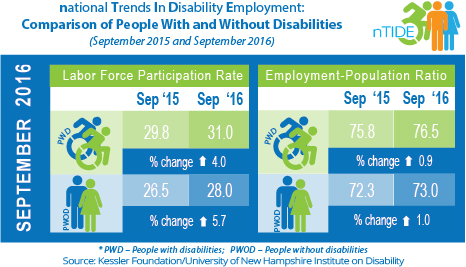|
Congressional Schedule
House and Senate currently on recess through the upcoming election on November 8. While Members of Congress on in their home states for the election season, AUCD members are encouraged to educate them about the needs of people with disabilities.
Presidential Debates
Topics addressed during last night's second presidential debate that may be of interest include: modeling appropriate and positive behavior for today's youth, Affordable Care Act, Children's Health Insurance Program, Medicaid, foster care, Islamophobia and Muslim-Americans, Syrian refugees, taxes, and selecting a Supreme Court justice. During one exchange, Secretary Clinton expressed "I worked to make sure that kids with disabilities could get a public education, [this is] something that I care very much about." Read the full transcript of the second 2016 presidential debate or search for key words.
Health Care
AUCD signed on to three coalition letters commenting on the 2018 Notice of Benefit and Payment Parameters (NBPP) proposed rule, which are the rules that will govern ACA health plans in 2018 (Medicare Rights Center, Habilitation Benefits Coalition/Coalition to Preserve Rehabilitation/Independence Through Enhancement of Medicare and Medicaid, and CCD Health Taskforce). The letters focused on network breadth, seamless care transition, disability discrimination, risk adjustment, Medicare and the marketplace, pre-existing condition insurance, and habilitative services.
Employment
In the Bureau of Labor Statistics Jobs Report released October 7, the employment-to-population ratio for working-age people with disabilities (PWD) increased from 26.5 percent in September 2015 to 28 percent in September 2016 (up 5.7 percent; 1.5 percentage points). For working-age people without disabilities (PWOD), the employment-to-population ratio also increased from 72.3 percent in September 2015 to 73.0 percent in September 2016 (up 1 percent; 0.7 percentage points).

AUCD signed on to a letter prepared by the CCD Rights Task Force to President Obama urging him to ensure that a final Rule implementing improvements to Section 501 of the Rehabilitation Act are issued before the end of this Administration. The President issued Executive Order 13548 on Increasing Federal Employment of Individuals with Disabilities. Since then, the country has seen a substantial improvement in the hiring and retention of people with disabilities in the Federal government.
The 501 regulation is essential to ensure that the recruitment and retention strategies required by the Executive Order are incorporated into law for the foreseeable future. We are very concerned that this regulation may be in jeopardy if it is not finalized before the end of Obama's presidency.
Money Follows the Person
The Consortium for Citizens with Disabilities (CCD) Long-Term Services and Supports (LTSS) Task Force, of which AUCD is a member, sent a letter to Chair Upton and Ranking Member Pallone (House Energy & Commerce), and Chair Hatch and Ranking Member Wyden (Senate Finance) expressing our support for reauthorizing the Money Follows the Person (MFP) program. Despite strong bi-partisan support and its benefit to thousands of individuals, this crucial program is about to disappear. The funding for MFP expired on Sept 30, 2016. This means that fewer people will be able to move back into a community setting, and state progress and momentum to shift systems from institutional to more cost-effective home and community-based settings will be slowed. Every effort should be made to educate Members of Congress about the impact of this program and the need to continue it.
Open Enrollment for 2017 Health Plans
- November 1, 2016: Open Enrollment starts - first day you can enroll, re-enroll, or change a 2017 insurance plan through the Health Insurance Marketplace. Coverage can start as soon as January 1, 2017
- December 15, 2016: Last day to enroll in or change plans for coverage to start January 1, 2017
- January 1, 2017: 2017 coverage starts for those who enroll or change plans by December 15
- January 31, 2017: Last day to enroll in or change a 2017 health plan. After this date, you can enroll or change plans only if you qualify for a Special Enrollment Period
- Note: There is no limited enrollment period for Medicaid or the Children's Health Insurance Program (CHIP)
Tuesdays with Liz: Disability Policy for All
During this week's edition of Tuesdays with Liz, Liz interviews Jennifer Mathis for part two of the two-part series on mental health and the connection to people with disabilities. View part one of this two-part series here.
For more from AUCD, follow @AUCDNews and like AUCD on Facebook
For updates from our Executive Director Andy Imparato, follow @AndyAUCD.
For more policy news, follow Kim on Twitter at @kmusheno
For definitions of terms used in In Brief, please see AUCD's Glossary of Legislative Terms
|
